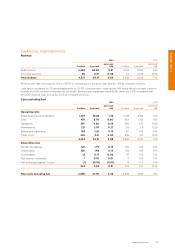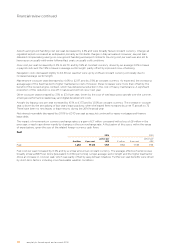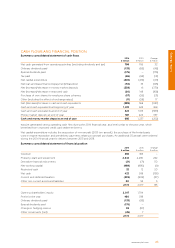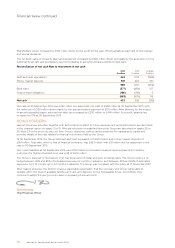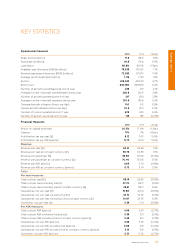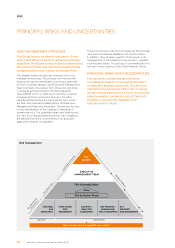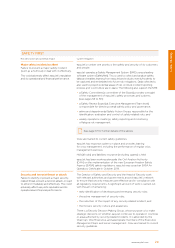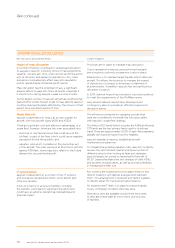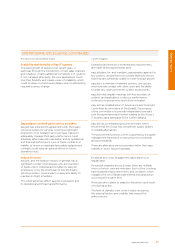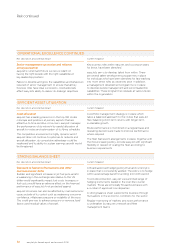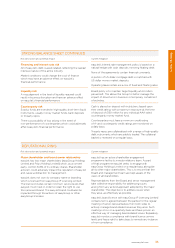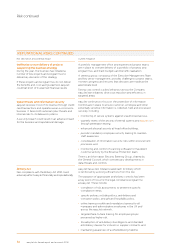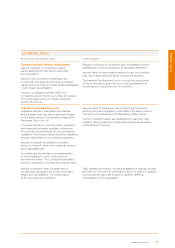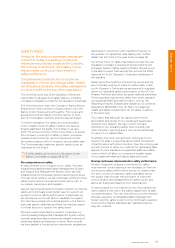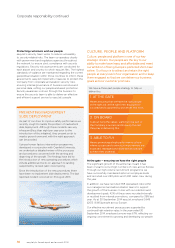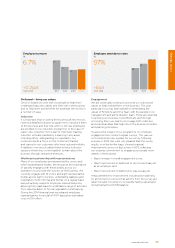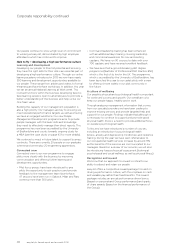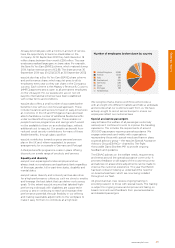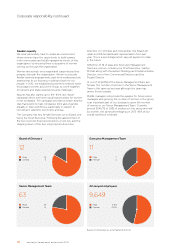EasyJet 2014 Annual Report Download - page 35
Download and view the complete annual report
Please find page 35 of the 2014 EasyJet annual report below. You can navigate through the pages in the report by either clicking on the pages listed below, or by using the keyword search tool below to find specific information within the annual report.
STRONG BALANCE SHEET CONTINUED
Risk description and potential impact Current mitigation
Financing and interest rate risk
All of easyJet’s debt is asset-related, reflecting the capital
intensive nature of the airline industry.
Market conditions could change the cost of finance
which may have an adverse effect on easyJet’s
financial performance.
easyJet’s interest rate management policy is based on a
natural hedge with cash deposits mirroring floating debt.
None of the agreements contain financial covenants.
A portion of US dollar mortgage debt is matched with
US dollar money market deposits.
Operating lease rentals are a mix of fixed and floating rates.
Liquidity risk
A misjudgement in the level of liquidity required could
result in business disruption and have an adverse effect
on easyJet’s financial performance.
Board policy is to maintain target liquidity at £4 million
per aircraft. This allows the Group to better manage the
impact of downturns in business or temporary curtailment
of activities.
Counterparty risk
Surplus funds are invested in high-quality short-term liquid
instruments, usually money market funds, bank deposits
or tri-party repos.
There is a possibility of loss arising in the event of
non-performance of counterparties which could adversely
affect easyJet’s financial performance.
Cash is placed on deposit with institutions based upon
their credit rating, with a maximum exposure at the time
of deposit of £150 million for any individual AAA rated
counterparty money market fund.
Counterparties must have a minimum credit rating
of A- and counterparty credit ratings are monitored on
a daily basis.
Tri-party repos are collateralised with a range of high-quality
debt instruments which are publicly traded. The collateral
basket is reviewed on a regular basis.
REPUTATIONAL RISKS
Risk description and potential impact Current mitigation
Major shareholder and brand owner relationship
easyJet has two major shareholders (easyGroup Holdings
Limited and Polys Holding Limited) which, as a concert
party, control 34.6% of its ordinary shares. Shareholder
activism could adversely impact the reputation of easyJet
and cause a distraction to management.
easyJet does not own its company name or branding
which is licensed from easyGroup IP Licensing Limited.
The licence includes certain minimum service levels that
easyJet must meet in order to retain the right to use
the name and brand. The easyJet brand could also be
impacted through the actions of easyGroup or other
easyGroup licensees.
easyJet has an active shareholder engagement
programme led by its investor relations team. As part
of that programme easyJet seeks to engage with
easyGroup Holdings Limited on a regular basis alongside
all its other major shareholders. This is to ensure that the
Board and management team are kept aware of the
views of all shareholders.
Representatives from the Board and senior management
take collective responsibility for addressing issues
arising from any activist approach adopted by the major
shareholder. The objective is to address issues when
they arise, as effectively as possible.
easyJet’s brand licence with easyGroup IP Licensing Limited
contains terms agreed between the parties for the regular
meeting of senior representatives from both sides to
actively manage brand-related issues as they arise. Such
meetings occur on a quarterly basis and have proven an
effective way of managing brand-related issues. Separately,
easyJet monitors compliance with brand licence service
levels and has a right to take steps to remedy any instance
of non-compliance.
www.easyJet.com 33
Strategic report


